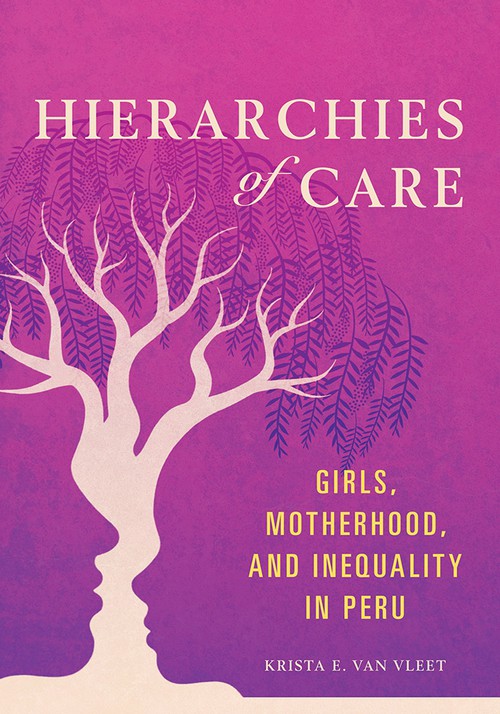
Hierarchies of Care
Cloth: 11/11/2019
About the Book
Palomitáy is an orphanage in highland Peru that provides a home for unmarried mothers as young as twelve years old. In their ordinary lives, these young women encounter diverse social expectations and face moral dilemmas. They endeavor to create a "good life" for themselves and their children in a context complicated by competing demands, economic uncertainties, and structured relations of power.Drawing on a year of qualitative on-site research, Krista E. Van Vleet offers a rich ethnography of Palomitáy's young women. She pays particular attention to the moral entanglements that emerge via people's efforts to provide care amid the inequalities and insecurities of today's Peru. State and nonstate participants involved in the women's intimate lives influence how the women see themselves as mothers, students, and citizens. Both deserving of care and responsible for caring for others, the young women must navigate practices interwoven with a range of a racial, gendered, and class hierarchies.
Groundbreaking and original, Hierarchies of Care highlights the moral engagement of young women seeking to understand themselves and their place in society in the presence of circumstances that are both precarious and full of hope.
About the Author
Krista E. Van Vleet is a professor of anthropology and chair of the Department of Anthropology at Bowdoin College. She is the author of Performing Kinship: Narrative, Gender, and the Intimacies of Power in the Andes.Reviews
"Hierarchies of Care: Girls, Motherhood, and Inequality in Peru proposes an exploration of power and morality through the care practices of a European-run orphanage where young mothers are sent by the Peruvian state." --Journal of Latin American and Caribbean Anthropology"Van Vleet writes not just about care but also with care. . . . Hierarchies of Care is a deeply thoughtful account of how young mothers in residence at Palomitáy strive to make good lives for themselves and for their children." --American Ethnologist
Blurbs
"Accessibly written and analytically sophisticated. Krista Van Vleet takes us backstage in a home for teenage mothers and their young children in Cusco, Peru. Faithfully witnessing the ordinary interactions of the young women, Van Vleet shows us how their moral experience is saturated by intertwined hierarchies of race, gender, and class. The mothers learn to care for their infants at the same time as they are taught to fit normatively into urban Peruvian modernity. Van Vleet's attention to the nuances of everyday life in the institution shakes up our preconceptions about relatedness and gender in the Andes, and our certainties about the moral dimensions of mother-child bonds."--Bruce Mannheim, coeditor of Indigenous Languages, Politics, and Authority in Latin America: Historical and Ethnographic Perspectives
"Taking as her fieldsite a Peruvian orphanage where adolescent wards of the state live with their own small children, Krista Van Vleet centers the stories and experiences of very young mothers who navigate violences and injustices large and small. Here, an international humanitarian NGO cares for young mothers and their children by teaching the mothers how to care. It's a tremendously layered lesson: an education in care smuggles with it understandings of racial and social hierarchy in Peru, hinting at the inadequacy of indigenous domesticity. Empathetically researched and clearly written, deeply respectful of and curious about the young women at Palomitáy, this book runs a far wider gamut than most ethnographies, engaging visual arts and performance, humanitarianism, gender, and kinship in a context of unrelenting neoliberalism. Van Vleet also works with more experimental methods--analyzing the photos taken by and the theater performed by the young women, mediated by NGO workers, in chapters that sing with rich descriptions and colorful, skillful images that generously invoke the contexts and the actions of the girls as they learn to consider themselves, and perhaps so to become, mothers."--Jessaca Leinaweaver, author of Adoptive Migration: Raising Latinos in Spain








